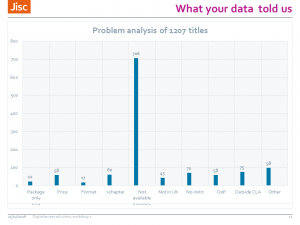We’ve had some very interesting conversations over the last couple of weeks with librarians about e-books, at Digifest and at the day-long workshop we held for project participants. We feel your pain!
The e-book market is in its infancy compared to print, so it probably isn’t all that surprising that there is still turbulence and some attempted solutions likely to die out, just as in evolutionary biology. The academic books market is also a little different than the trade book or general fiction market where most progress to date has occurred. Academic books often contain tricky things like tables and figures, mathematical notation and references, that some e-formats just don’t display comfortably.
Unsure of the best fix, publishers and aggregators are trying out different business models, different formats and platforms, and imposing a host of different sets of licence terms and conditions to see which work for you and them. But that causes headaches for those trying to present their patrons with a coherent collection. Meanwhile, students and lecturers are getting frustrated because they need access to the content sooner not later. How the library manages these things is of no interest to them.
We’ve collected over 1200 titles identified by librarians as problematic for them in some way, and started to work on the data. Simply not being able to find out about e-book versions emerged as the biggest problem, and conversations since have confirmed this as a top priority.
We’re working on finding out more about these titles, since the reasons behind not being able to find them as e-books vary. When we have a bit more to go on, we’ll be able to start discussing possible solutions to some of the problems.
We’ve also found that although libraries have different preferred business models (credits, rentals, EBP, PDA) they’d much prefer it if they could buy outright at a reasonable price. In-library access only is almost universally considered useless, because students want to work at times and in places to suit them, not the library’s opening hours. And with geographically-split campuses and distance-learning becoming more widespread, remote access is important for librarians and patrons alike.
For most libraries, access to monographs is to fulfil requests for reading lists. That doesn’t mean research requests, space-saving, preservation or collection-building is unimportant, just that having material for students to access for their courses is the strategic priority. I’m not sure publishers have woken up to the rise of student satisfaction scores when they think about this type of content, and how libraries need to be able to make it available more widely. There must be some opportunities where a need exists.


